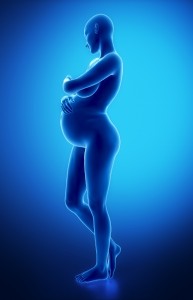Giving birth is one of the most incredible feats of the human body. It requires physiological changes and physical effort far beyond that which most of us experience in our daily lives. There is no single experience of pregnancy and birth; for some it is a walk in the park; for others it’s a slog from the outset.
What becomes clear to many, is that they don’t feel that they are getting the what they need from the NHS. This maybe because they have a personal history of back problems that are not addressed prior to pregnancy or if they have problems while they are pregnant the treatment offered can be very generalised and not specific to their case.
At BeWell clinic our Osteopaths are experienced in helping patients prepare for pregnancy. Treatments are suited to the individual and their stage of pregnancy, all hands-on techniques are gentle and intended to relieve tension and pain.
The General Strain Pattern of Pregnancy
Mother
Preparation for Pregnancy:
An assessment examines how the low back and pelvis of the patient are functioning in relation to the rest of their spine. Looking to maximise the biomechanical function of the lumbo-sacral junction and coordinate the postural muscles and hip flexors (i.e. make sure there are no restrictions to prevent the pelvis opening up).
Support in Pregnancy:
Gentle treatments to ease the discomfort of pregnancy particularly backache, shoulder strain or pelvic pain problems. Treatment consists of massage, joint articulation, gentle stretches and advice on keeping the body moving.
Post Pregnancy:
An assessment and treatment to remove the strains of the pregnancy and birth to allow the body to function at it’s best. This can make sleeping and feeding more comfortable for mother and baby.
Epidurals and future back pain:
The effect of having an epidural on the long term heath of your back is hard to determine as there are so many factors involved ( i.e. the skill of the operator, the state of the patient when the needle is injected and the amount of medication administered) It is certainly my experience that a number of patients associate the onset of back problems with having an epidural and the location of their ongoing pain is commensurate with the needle injection site. This doesn’t necessarily mean that an epidural is to be avoided, it may be the appropriate treatment for you at that time, but if you suffer ongoing back problems afterwards; then an Osteopathic assessment is recommended.
Cesareans and future back pain
Cesarean sections are traumatic to the stomach muscles. It is essential to address the weakness with core stability exercises to re-establish the support that they give to the spine. The after care that patients receive post c-section varies, it could take months or years for a low back problem to arise from weakened stomach muscles so it is important to invest the time to strengthen them, particularly if you have had more than one in close succession or you took a while to recover from your procedure. Not all mothers receive the ongoing support they might expect after a c-section.
After the birth
Quite often the strain of pregnancy or traumatic birth are retained in the body of the mother, this is exacerbated by repetitive feeding, poor sleep etc. When you have been expecting a first child, quite often you perceive this as the end result- the ongoing 24 hour care required can come as a bit of a shock.
Changed sleep patterns, lifting, feeding , pushing chairs, travel cots, lack of time for exercise. These things settle down over time, but some gentle osteopathic treatment can often make this stage a little easier.
Looking back
Many women in their early forties can attribute the onset of their back problems to past pregnancies and it is often a few years before the problems arise:
1. Pregnancy can significantly change or strain the body – these strains may require treatment to be resolved.
2. Looking after young children is hard work! lifting, carrying, push chairs etc…
3. Life changes mean that many women loose their core fitness at this point, they no longer have the time to focus on their own health and so the gradual fitness of their twenties declines year on year.
We recommend having post pregnancy treatment to remove the strain of pregnancy and suggest that regular light exercise is helpful as soon as the mother feels able. Specific core stability exercises are recommended to strengthen the back and pelvic floor . It is really important that mothers take the time out to maintain their own health going forward, this can mean prioritising exercise classes or simply taking the time to work through an exercise routine.
Household chores maybe tiring but they do not constitute exercise as the required muscles are not worked!
If you prefer to spend all your time cleaning or fail to make time to take care of yourself, do not be surprised if back issues become a regular part of your life.
Osteopathy For Newborns and Children.

